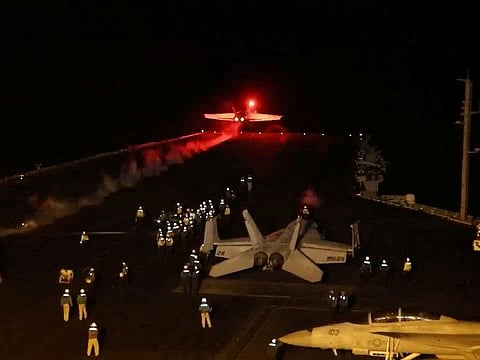China, India can exert influence to help wind down Red Sea crisis
These Asian heavyweights have a heavy reliance on shipments through these waters

The Red Sea crisis stemming from the Houthis’ attacks on commercial ships carry two dimensions.
One is related to propaganda, aimed at garnering popular support for the Yemen-based group and its allies by exploiting the Israeli aggression on the Palestinian people. The other is practical, focusing on the impact on international trade passing through this crucial sea corridor.
Despite media exaggeration regarding the effects on ship and oil tanker bombings, the power balance between the Houthis and the coalition formed to thwart these attacks and secure safe navigation through the Bab Al Mandab Strait is not even minimally comparable.
Going by rules of engagement
If a serious decision were made to halt these attacks, the mission could be accomplished within days. In practice, both sides engage in limited strikes within the agreed-upon "rules of engagement" to prevent the conflict from escalating beyond current arrangements.
The primary concern here is the second aspect related to the hindrance on global trade and the most affected countries. This tension has resulted in increased shipping costs and provided a lucrative opportunity for market speculators, particularly in oil markets, among others.
More impactful for some nations
Ironically, the countries most impacted by this crisis are China and India, alongside Russia to an extent, all of whom have strong ties with some parties to the conflict. This has prompted them to exert relentless efforts to de-escalate the situation and create a conducive environment for freedom of navigation.
On the one hand, they expressed their discontent and complaint over the bombings, which have not affected Israel as much as they have harmed nations heavily reliant on the Bab Al Mandab Strait and the Suez Canal, such as China and India. In India's case, 80 per cent of its trade with Europe goes through the Red Sea.
These two powerful Asian countries’ rapid growth rely on their trade relationships with Europe and the Americas, and their exports and imports pass heavily through the Bab Al Mandab. This stands in contrast to Europe's trade with the Americas, which takes place directly through the Atlantic Ocean.
Industrial needs
While the current damage is still relatively limited to China and India trade, an escalation may cause serious damage, not to their foreign trade, but to their economic sectors, especially the industrial. They rely on import of components for their industries, particularly those based on high tech and advanced machinery from Europe.
Notably, some Chinese automotive industries utilise European knowhow, a trend mirrored in India and South Korea as well.
This means the potential of any shortage in the delivery of these equipment will cause substantial losses to industries in these countries, and may lead to shutdowns, in addition to the impact on their trade balances due to the contraction in exports and depriving them of their main markets.
The impact of this damage will extend to the countries of the EU and the US, albeit to a lesser extent. Their intervention within the rules of engagement is driven by their role as nations with primary international responsibility for ensuring the safety of sea routes and transportation in all its forms, a responsibility to which they have committed since the end of the Second World War.
Besides them, the impact on regional countries remains limited, including for the GCC nations. The GCC’s trade exchanges have undergone significant changes during the past two decades, shifting the center of gravity from West to East. This indicates that their foreign trade, including oil and gas, does not pass through the troubled Bab Al Mandab, which prompted them to consider that the solution to this crisis belongs to the international community at large - as a global crisis rather than a regional one.
This crisis will not be prolonged, given its repercussions on countries with friendly ties to some of the conflict parties, particularly that of China’s. These countries are expected to intensify their pressure to ensure an end to attacks on ships and ensure freedom of navigation in the Red Sea.
Crisis will wind down
In this context, China’s Foreign Ministry spokeswoman Mao Ning had said, "We call for an end to the harassment of civilian ships in order to maintain the smooth transit of international production and supply chains and safeguard the international trade order.”
It is more likely that the Houthi group and allies will respond to these pressures more than they respond to counter-bombardments, which they have been able to adapt to.








